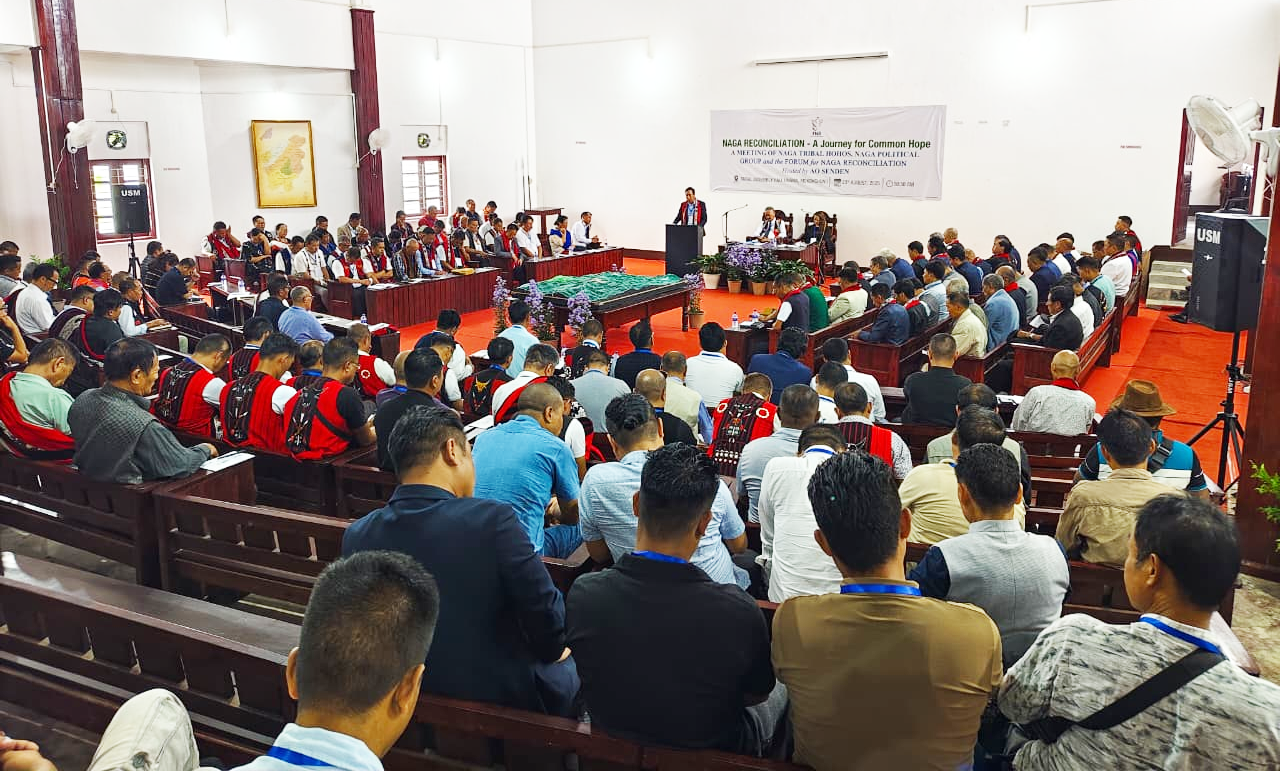In what could be a historic turning point for the Naga political movement, President of Ao Senden, Marsanen Imsong delivered an uncompromising message on August 23 during the Forum for Naga Reconciliation (FNR) meeting held in Ungma.
In his address, Imsong warned that the time for reconciliation will not come again if wasted now.
“True reconciliation is the greatest victory we can claim. It is a choice—and that choice must be made now. This moment calls for courage; it is now or never,” he declared before a packed gathering of community leaders, stakeholders, and representatives from Naga Political Groups (NPGs), Naga Tribal Hohos, FNR.
Acknowledging FNR’s relentless efforts over the past 18 years to bridge divisions, he said their work has been instrumental in keeping the dream of unity alive. But, he warned, symbolism and statements are not enough anymore.
“Thousands of lives, decades of prayers, and generations of hope have brought us here. The future depends on the step we take today—from brokenness toward healing,” he stressed.
Addressing the core challenge, Ao Senden President highlighted the deep mistrust and fragmentation among NPGs. “Our words can heal and unite, or they can divide and destroy. From this day, let every speech and every written word serve one goal—the reconciliation and unity of the Naga people,” he said, urging leaders to abandon divisive postures and move toward a common platform.
He reminded the house that history will be relentless in its judgment: “Tomorrow’s generations will not measure us by our titles or tenures, but by the legacy we leave behind. The time for delay is over. The Naga people are watching and waiting for us to act with humility, wisdom, and courage.”
In a tone both challenging and hopeful, the Ao Senden President placed the responsibility squarely on the shoulders of Naga political leaders, “Let us walk out of this hall not as representatives of separate groups, but as architects of a common destiny. If the Naga Political Groups truly desire reconciliation and unity, we are ready to walk this path together—with humility and resolve.”
He concluded his address with a reminder that reconciliation is not merely a political demand but a moral obligation that defines the future of the Naga people: “This is our moment, a moment that generations have prayed and bled for. Let us not fail.”
Download Nagaland Tribune app on Google Play

Reconciliation is not an option, it is a necessity: Visier Sanyü
Delivering his address at Ungma, Visier Sanyü, member of Forum for Naga Reconciliation (FNR) affirmed that reconciliation among the Nagas is not an option but a necessity. He said the Nagas must rise above bitterness, heal wounds, and walk the road of reconciliation together.
Recalling AZ Phizo, the Father of the Naga Nation, Sanyü reminded that Phizo’s vision was of a united nation, not a fractured one. He urged that true honour to his legacy would be by embracing unity and identity as one people.
“Reconciliation does not mean forgetting our past. It means redeeming it. It means forgiveness where there has been pain, dialogue where there has been mistrust, and unity where there has been division,” Sanyü said, adding that if Nagas can quarrel, they can also reconcile.
Quoting the Scriptures, he said, “How good and pleasant it is when brothers dwell together in unity” (Psalm 133:1). He pointed out that reconciliation is not merely political but deeply spiritual, calling for humility, compassion, and courage.
Calling the moment historic, Sanyü said the world is watching, India is listening, and the people are waiting. He asserted that a peaceful settlement is within reach—one that restores dignity, builds bridges with India and Burma, and leaves future generations “a garden of peace and hope.”
“My friends, we face a choice. Division or unity. Conflict or reconciliation. Death or life. Today, let us choose reconciliation. Let us choose unity. Let us choose life,” he concluded.
Unity is our greatest strength, says Imtidongba Jamir
Imtidongba Jamir, Tatar, Senior Ungma Kosasanger Puso Menden, from Ungma Council welcomed leaders and delegates to Ungma village, stressing that unity remains the greatest strength of the Naga people.
He acknowledged the Forum for Naga Reconciliation (FNR) for its efforts since 2008 in promoting understanding, forgiveness, and reconciliation, saying it has reminded the people that no difference is greater than the shared longing for peace and self-determination.
Quoting Psalm 133:1, he said, “How good and pleasant it is when brothers live together in unity,” and reminded that unity is not only beautiful but powerful.
Highlighting the struggles faced by Nagas through history, he said the courage and strength of past generations of warriors and headhunters remain alive today. However, he added that courage alone is not enough and that true strength comes when Nagas stand together as one.
“Without unity, we may lose sight of our true identity and our shared goal,” he said, while terming the presence of leaders in Ungma as a blessing and a reminder of collective efforts towards unity.
He concluded by reaffirming, “We are one people, with one history, and one future. When we are united, no force on earth can break us.”

